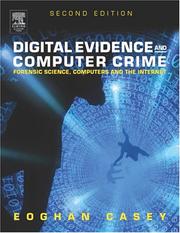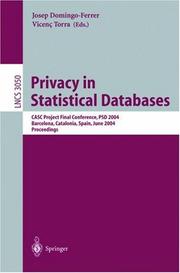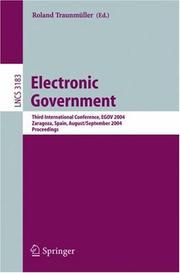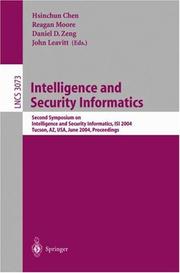| Listing 1 - 5 of 5 |
Sort by
|

ISBN: 0121631044 Year: 2004 Publisher: Amsterdam Boston Academic Press
Abstract | Keywords | Export | Availability | Bookmark
 Loading...
Loading...Choose an application
- Reference Manager
- EndNote
- RefWorks (Direct export to RefWorks)
Computer crimes. --- Evidence, Criminal. --- 681.3*K5 --- 681.3*K5 Legal aspects of computing --- Legal aspects of computing --- Criminal evidence --- Criminal investigation --- Criminal procedure --- Evidence (Law) --- Reasonable doubt --- Computers and crime --- Cyber crimes --- Cybercrimes --- Electronic crimes (Computer crimes) --- Internet crimes --- Crime --- Privacy, Right of --- Computer crimes --- Electronic evidence --- Evidence, Criminal --- Digital evidence --- Evidence, Documentary

ISBN: 1280307714 9786610307715 3540259554 3540221182 Year: 2004 Publisher: Berlin, Heidelberg : Springer Berlin Heidelberg : Imprint: Springer,
Abstract | Keywords | Export | Availability | Bookmark
 Loading...
Loading...Choose an application
- Reference Manager
- EndNote
- RefWorks (Direct export to RefWorks)
Privacy in statistical databases is about ?nding tradeo?s to the tension between the increasing societal and economical demand for accurate information and the legal and ethical obligation to protect the privacy of individuals and enterprises, which are the source of the statistical data. Statistical agencies cannot expect to collect accurate information from individual or corporate respondents unless these feel the privacy of their responses is guaranteed; also, recent surveys of Web users show that a majority of these are unwilling to provide data to a Web site unless they know that privacy protection measures are in place. “Privacy in Statistical Databases2004” (PSD2004) was the ?nal conference of the CASC project (“Computational Aspects of Statistical Con?dentiality”, IST-2000-25069). PSD2004 is in the style of the following conferences: “Stat- tical Data Protection”, held in Lisbon in 1998 and with proceedings published by the O?ce of O?cial Publications of the EC, and also the AMRADS project SDC Workshop, held in Luxemburg in 2001 and with proceedings published by Springer-Verlag, as LNCS Vol. 2316. The Program Committee accepted 29 papers out of 44 submissions from 15 di?erentcountriesonfourcontinents.Eachsubmittedpaperreceivedatleasttwo reviews. These proceedings contain the revised versions of the accepted papers. These papers cover the foundations and methods of tabular data protection, masking methods for the protection of individual data (microdata), synthetic data generation, disclosure risk analysis, and software/case studies.
Computer science. --- Database management. --- Artificial intelligence. --- Computers --- Mathematical statistics. --- Computer Science. --- Database Management. --- Probability and Statistics in Computer Science. --- Computers and Society. --- Legal Aspects of Computing. --- Artificial Intelligence (incl. Robotics). --- Statistics and Computing/Statistics Programs. --- Computer security --- Databases --- Data protection --- Computer Science --- Engineering & Applied Sciences --- Law and legislation. --- Statistics --- Data banks --- Data bases --- Databanks --- Database systems --- Data structures (Computer science). --- Data encryption (Computer science). --- Computers and civilization. --- Computers. --- Data Structures, Cryptology and Information Theory. --- Data Encryption. --- Computer files --- Electronic information resources --- Data structures (Computer scienc. --- Data Structures and Information Theory. --- Cryptology. --- Cyberspace --- Informatics --- Science --- Data base management --- Data services (Database management) --- Database management services --- DBMS (Computer science) --- Generalized data management systems --- Services, Database management --- Systems, Database management --- Systems, Generalized database management --- Electronic data processing --- Data encoding (Computer science) --- Encryption of data (Computer science) --- Cryptography --- Law and legislation --- Civilization and computers --- Civilization --- Automatic computers --- Automatic data processors --- Computer hardware --- Computing machines (Computers) --- Electronic brains --- Electronic calculating-machines --- Electronic computers --- Hardware, Computer --- Computer systems --- Cybernetics --- Machine theory --- Calculators --- Mathematics --- Statistical inference --- Statistics, Mathematical --- Probabilities --- Sampling (Statistics) --- Information structures (Computer science) --- Structures, Data (Computer science) --- Structures, Information (Computer science) --- File organization (Computer science) --- Abstract data types (Computer science) --- Statistical methods

ISBN: 1280308060 9786610308064 3540246835 354022002X Year: 2004 Publisher: Berlin, Heidelberg : Springer Berlin Heidelberg : Imprint: Springer,
Abstract | Keywords | Export | Availability | Bookmark
 Loading...
Loading...Choose an application
- Reference Manager
- EndNote
- RefWorks (Direct export to RefWorks)
“We know more than we can tell and we can know nothing without relying upon those things which we may not be able to tell” (Michael Polanyi) The importance of knowledge management (KM) is increasingly recognized in the public sector and in relation with e-government implementations. Because governments and public administrations deal with information and knowledge on a large scale, this domain is particularly predestined to actively practice KM: much of the work of public authorities refers to the elaboration of data, information and knowledge on citizens, businesses, society, the markets, the environment, laws, politics, etc. Even many “products” of public administration and government are delivered in the shape of information and knowledge themselves. This aspect especially applies to the policies, management, regulation and monitoring of society, markets and the environment. With the recent evolution of e-government projects, high expectations are linked. As a consequence, efficient support from adequate KM conceptsandtoolstoexploitthehugeknowledgeandinformationresourcesdealt with in e-government is expected. Not only the trend towards a knowledge society calls for KM solutions. Current e-government developments significantly influence the public sector. These require the rethinking of knowledge distribution and management: Citizen- and business- oriented service delivery, including one-stop service provision, inter-oganizational co-operation between government agencies and cross-border support for complex administrative decision making call for largely opened-up access to remote information and knowledge resources. E-government – and specifically the concept of online one-stop government – integrates dislocated information and knowledge sources into a global virtual knowledge fabric.
Computer science. --- Information systems. --- Artificial intelligence. --- Education. --- Computers --- Information Systems. --- Computer Science. --- Artificial Intelligence (incl. Robotics). --- Information Systems Applications (incl.Internet). --- Computers and Society. --- Management of Computing and Information Systems. --- Legal Aspects of Computing. --- Computers and Education. --- Law and legislation. --- Internet in public administration. --- Knowledge management. --- Management of knowledge assets --- Digital government --- E-government --- Electronic government --- Online government --- Political science. --- Data structures (Computer science). --- Computers and civilization. --- Management information systems. --- Political Science and International Relations. --- Political Science. --- Data Structures, Cryptology and Information Theory. --- Information Systems Applications (incl. Internet). --- Management --- Information technology --- Intellectual capital --- Organizational learning --- Public administration --- Data structures (Computer scienc. --- Data Structures and Information Theory. --- Artificial Intelligence. --- Informatics --- Science --- Administration --- Civil government --- Commonwealth, The --- Government --- Political theory --- Political thought --- Politics --- Science, Political --- Social sciences --- State, The --- AI (Artificial intelligence) --- Artificial thinking --- Electronic brains --- Intellectronics --- Intelligence, Artificial --- Intelligent machines --- Machine intelligence --- Thinking, Artificial --- Bionics --- Cognitive science --- Digital computer simulation --- Electronic data processing --- Logic machines --- Machine theory --- Self-organizing systems --- Simulation methods --- Fifth generation computers --- Neural computers --- Application software. --- Computer-based information systems --- EIS (Information systems) --- Executive information systems --- MIS (Information systems) --- Sociotechnical systems --- Information resources management --- Civilization and computers --- Civilization --- Application computer programs --- Application computer software --- Applications software --- Apps (Computer software) --- Computer software --- Information structures (Computer science) --- Structures, Data (Computer science) --- Structures, Information (Computer science) --- File organization (Computer science) --- Abstract data types (Computer science) --- Communication systems

ISBN: 3540229167 3540300783 Year: 2004 Publisher: Berlin, Heidelberg : Springer Berlin Heidelberg : Imprint: Springer,
Abstract | Keywords | Export | Availability | Bookmark
 Loading...
Loading...Choose an application
- Reference Manager
- EndNote
- RefWorks (Direct export to RefWorks)
VI Preface Linz, August 2004 Roland Traunmüller Roland Traunmüller, University of Linz, Austria VIII Program Committee Program Committee IX Bartosz Nowicki, Rodan Systems, Poland Mariusz Momotko, Rodan Systems, Poland Robert Müller-Török, University of Debrecen, Leipzig, BBVL, Germany Table of Contents Introduction e-Government: The Challenges Ahead. . . . . . . . . . . . . . . . . . . . . . . . . . . . . . . . . . . 1 Roland Traunmul ¨ ler and Maria Wimmer e-Democracy Electronic Democracy and Power. . . . . . . . . . . . . . . . . . . . . . . . . . . . . . . . . . . . . . . 7 Anders R. Olsson Young People and e-Democracy: Creating a Culture of Participation. . . . . . . . . . . 15 Zoe ¨ Masters, Ann Macintosh, and Ella Smith The Support for Different Democracy Models by the Use of a Web-Based Discussion Board. . . . . . . . . . . . . . . . . . . . . . . . . . . . . 23 Øystein Sæbø and Hallgeir Nilsen The Framework of e-Democracy Development. . . . . . . . . . . . . . . . . . . . . . . . . . . . 27 Wichian Chutimaskul and Suree Funilkul Networked ICT to Foster e-Democracy? . . . . . . . . . . . . . . . . . . . . . . . . . . . . . . . . . 31 Peter Mambrey Interoperability Analysis of the Interoperability Frameworks in e-Government Initiatives. . . . . . . . 36 Luis Guijarro An Overview of DC-Based e-GovernmentMetadata Standards and Initiatives. . . . 40 Efthimios Tambouris and Konstantinos Tarabanis Enterprise Architecture for e-Government. . . . . . . . . . . . . . . . . . . . . . . . . . . . . . . . 48 Beryl Bellman and Felix Rausch Information Integration or Process Integration? How to Achieve Interoperability in Administration. . . . . . . . . . . . . . . . . . . . . . . . . 57 Ralf Klischewski Security Requirements Engineering for e-GovernmentApplications: Analysis of Current Frameworks . . . . . . . . . . . . . . . . . . . . . . . . . . . . . . . . . . . . . . . 66 Christos Kalloniatis, Evangelia Kavakli, and Stefanos Gritzalis XII Table of Contents Semantic Lexicons for Accessing Legal Information. . . . . . . . . . . . . . . . . . . . . . . . 72 Maria-Teresa Sagri and Daniela Tiscornia Impact of e-Government Interoperability in Local Governments. . . . . . . . . . . . . . . 82 Norbert Benamou, Alain Busson, and Alain Keravel Process Management e-Government Intermediation. . . . . . . . . . . . . . . . . . . . . . . . . . . . . . . . . . . . . . . . . . 88 Aljosa Pasic, Anne-Marie Sassen, and Alicia Garcia Comprehensive Process Management in Public Administrations – A Case Study .
Computer science. --- Computer Communication Networks. --- Information systems. --- Computers --- Information Systems. --- Computer Science. --- Computers and Society. --- Management of Computing and Information Systems. --- Legal Aspects of Computing. --- User Interfaces and Human Computer Interaction. --- Computer Appl. in Administrative Data Processing. --- Internet in public administration --- Electronic government information --- Government - General --- Law, Politics & Government --- Political Institutions & Public Administration - General --- Law and legislation. --- #SBIB:35H24 --- #SBIB:35H502 --- #SBIB:309H1720 --- #SBIB:309H1713 --- #SBIB:043.IOS --- Informatiemanagement bij de overheid --- Bestuur en samenleving: overheidscommunicatie --- Informatiekunde, informatie management --- Mediatechnologie: nieuwe toepassingen (abonnee-televisie, electronic mail, desk top publishing, virtuele realiteit...) --- E-government --- E-government. --- Electronic government publications --- Government information --- Computer network resources --- Computer communication systems. --- User interfaces (Computer systems). --- Computers and civilization. --- Computers. --- Management information systems. --- Public administration. --- Economics. --- Public Administration. --- Administration, Public --- Delivery of government services --- Government services, Delivery of --- Public management --- Public sector management --- Political science --- Administrative law --- Decentralization in government --- Local government --- Public officers --- Informatics --- Science --- Computer-based information systems --- EIS (Information systems) --- Executive information systems --- MIS (Information systems) --- Sociotechnical systems --- Information resources management --- Management --- Automatic computers --- Automatic data processors --- Computer hardware --- Computing machines (Computers) --- Electronic brains --- Electronic calculating-machines --- Electronic computers --- Hardware, Computer --- Computer systems --- Cybernetics --- Machine theory --- Calculators --- Cyberspace --- Civilization and computers --- Civilization --- Interfaces, User (Computer systems) --- Human-machine systems --- Human-computer interaction --- Communication systems, Computer --- Computer communication systems --- Data networks, Computer --- ECNs (Electronic communication networks) --- Electronic communication networks --- Networks, Computer --- Teleprocessing networks --- Data transmission systems --- Digital communications --- Electronic systems --- Information networks --- Telecommunication --- Cyberinfrastructure --- Electronic data processing --- Network computers --- Communication systems --- Distributed processing --- Government publications --- Law and legislation

ISBN: 1280307757 9786610307753 354025952X 3540221255 Year: 2004 Publisher: Berlin, Heidelberg : Springer Berlin Heidelberg : Imprint: Springer,
Abstract | Keywords | Export | Availability | Bookmark
 Loading...
Loading...Choose an application
- Reference Manager
- EndNote
- RefWorks (Direct export to RefWorks)
The past two years have seen signi?cant interest and progress made in national and homeland security research in the areas of information technologies, orga- zational studies, and security-related public policy. Like medical and biological research, which is facing signi?cant information overload and yet also trem- dous opportunities for new innovation, the communities of law enforcement, criminal analysis, and intelligence are facing the same challenge. As medical - formatics and bioinformatics have become major ?elds of study, the science of “intelligence and security informatics” is now emerging and attracting interest from academic researchers in related ?elds as well as practitioners from both government agencies and industry. Broadly de?ned, intelligence and security informatics is the study of the - velopmentanduseofadvancedinformationtechnologiesandsystemsfornational and homeland security related applications, through an integrated technological, organizational, and policy based approach. The First Symposium on Intelligence and Security Informatics (ISI2003) was held in June 2003 in Tucson, Arizona. It provided a stimulating intellectual forum of discussions among previously d- paratecommunities:academicresearchersininformationtechnologies,computer science, public policy, and social studies; local, state, and federal law enfor- ment and intelligence experts; and information technology industry consultants and practitioners. Building on the momentum of ISI2003, we held the Second Symposium on IntelligenceandSecurityInformatics(ISI2004)inJune2004inTucson,Arizona.
Computer science. --- Operating systems (Computers). --- Information storage and retrieval systems. --- Information systems. --- Computers --- Information Systems. --- Computer Science. --- Information Systems Applications (incl.Internet). --- Information Storage and Retrieval. --- Operating Systems. --- Computers and Society. --- Legal Aspects of Computing. --- Management of Computing and Information Systems. --- Expert systems (Computer science) --- Data mining --- Computer security --- National security --- Engineering & Applied Sciences --- Computer Science --- Law and legislation. --- Computer privacy --- Computer system security --- Computer systems --- Cyber security --- Cybersecurity --- Electronic digital computers --- Security of computer systems --- Algorithmic knowledge discovery --- Factual data analysis --- KDD (Information retrieval) --- Knowledge discovery in data --- Knowledge discovery in databases --- Mining, Data --- Knowledge-based systems (Computer science) --- Systems, Expert (Computer science) --- Security measures --- Protection of computer systems --- Protection --- Information storage and retrieval. --- Artificial intelligence. --- Computers and civilization. --- Computers. --- Artificial Intelligence (incl. Robotics). --- Information Systems Applications (incl. Internet). --- Database searching --- Artificial intelligence --- Soft computing --- Data protection --- Security systems --- Hacking --- Information storage and retrieva. --- Artificial Intelligence. --- Cyberspace --- Informatics --- Science --- Computer operating systems --- Disk operating systems --- Systems software --- AI (Artificial intelligence) --- Artificial thinking --- Electronic brains --- Intellectronics --- Intelligence, Artificial --- Intelligent machines --- Machine intelligence --- Thinking, Artificial --- Bionics --- Cognitive science --- Digital computer simulation --- Electronic data processing --- Logic machines --- Machine theory --- Self-organizing systems --- Simulation methods --- Fifth generation computers --- Neural computers --- Law and legislation --- Operating systems --- Automatic data storage --- Automatic information retrieval --- Automation in documentation --- Computer-based information systems --- Data processing systems --- Data storage and retrieval systems --- Discovery systems, Information --- Information discovery systems --- Information processing systems --- Information retrieval systems --- Machine data storage and retrieval --- Mechanized information storage and retrieval systems --- Electronic information resources --- Data libraries --- Digital libraries --- Information organization --- Information retrieval --- Application software. --- Automatic computers --- Automatic data processors --- Computer hardware --- Computing machines (Computers) --- Electronic calculating-machines --- Electronic computers --- Hardware, Computer --- Cybernetics --- Calculators --- Civilization and computers --- Civilization --- Application computer programs --- Application computer software --- Applications software --- Apps (Computer software) --- Computer software
| Listing 1 - 5 of 5 |
Sort by
|

 Search
Search Feedback
Feedback About UniCat
About UniCat  Help
Help News
News